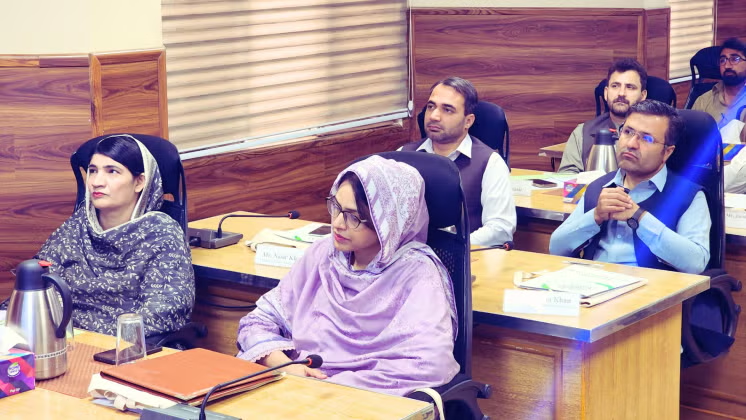


In Balochistan, more than 20 government officials received training on evidence-based approaches to decision-making during a workshop co-led by the Center for Learning on Evaluation and Results for Pakistan and Central Asia (CLEAR-PCA), an implementing partner of GEI.
“The workshop highlighted how structured tools of strategic decision-making can be applied through monitoring and evaluation frameworks. It has helped me understand how evidence can be used more systematically in policy decisions," Zakaria Khan, Deputy Director, Planning and Development Department of Balochistan.
On 21–22 May 2025 in Quetta, the Balochistan Civil Service Academy (BCSA), in collaboration with the Center for Learning on Evaluation and Results for Pakistan and Central Asia (CLEAR PCA), an implementing partner of the Global Evaluation Initiative (GEI), and CERP, conducted a two-day capacity-building workshop titled “Strategic Approaches to Policy Decision-Making.”
The workshop was organized under a formal Memorandum of Understanding between CLEAR-PCA, CERP, and BCSA. This partnership is dedicated to enhancing the professional capacity of government officials through specialized, demand-driven training programs, with a strong focus on embedding monitoring and evaluation (M&E) principles into policy-making processes.
In Pakistan, M&E is often treated as a procedural requirement rather than a tool for learning, accountability, and knowledge generation. This limited perspective, combined with capacity gaps and an overemphasis on process monitoring, has weakened demand for M&E reform and constrained efforts to improve policy effectiveness. The workshop addressed this challenge by equipping participants with strategic tools and evidence-based approaches that reinforce the role of M&E as a foundation for stronger policy making.
The workshop brought together 25 officials (21 men, 4 women) from provincial line departments, district administrations, and academia. Nominated by their respective senior management, participants engaged in a program specifically designed to strengthen their ability to integrate data, evidence, and evaluative thinking into policy formulation and decision-making.
Over the two days, participants explored systems approaches, theory of change, cost-benefit and cost-effectiveness analysis, decision trees, and policy analysis. These frameworks, central to both policy making and M&E practice, were reinforced through simulation exercises and case studies on locally relevant themes such as water, sanitation, and hygiene (WASH) and female labor force participation. By applying these tools in context, participants learned how to use evaluation techniques to assess trade-offs, measure effectiveness, and justify policy choices.
Reflecting on the workshop, Dr. Rohail Aziz Khoso, Deputy Secretary, said: “The training gave me clarity on how tools such as theory of change and cost-effectiveness analysis, often used in evaluation, can directly support decision-making. This link between M&E and policy choices was particularly valuable.”
The program also engaged faculty from leading provincial universities alongside policy makers, creating a space for academic–policy collaboration. This exchange demonstrated how evaluation research and data analysis can inform government action.
As Dr. Tahira Mengal, Sardar Bahadur Khan Women’s University, noted: “The workshop helped us see how evaluative approaches can generate practical evidence for policy discussions. It encouraged us to move beyond theory and focus on how data and evaluation can guide real decisions.”
A district-level perspective was also shared by Shazia Baloch, Additional Deputy Commissioner, who reflected: “At the district level, we often struggle to justify program priorities due to limited data. The workshop showed how M&E tools can be used to assess what works and make a stronger case for resource allocation. This will help us plan more effectively and respond to local needs.”
The workshop concluded with strong feedback on its relevance and impact. Participants emphasized the importance of using M&E frameworks not only to monitor programs but also to guide strategic policy choices and resource allocation. Building on this momentum, such initiatives are expected to reinforce a culture of evidence-based policy making in Balochistan and generate greater demand for institutionalizing M&E systems across government.